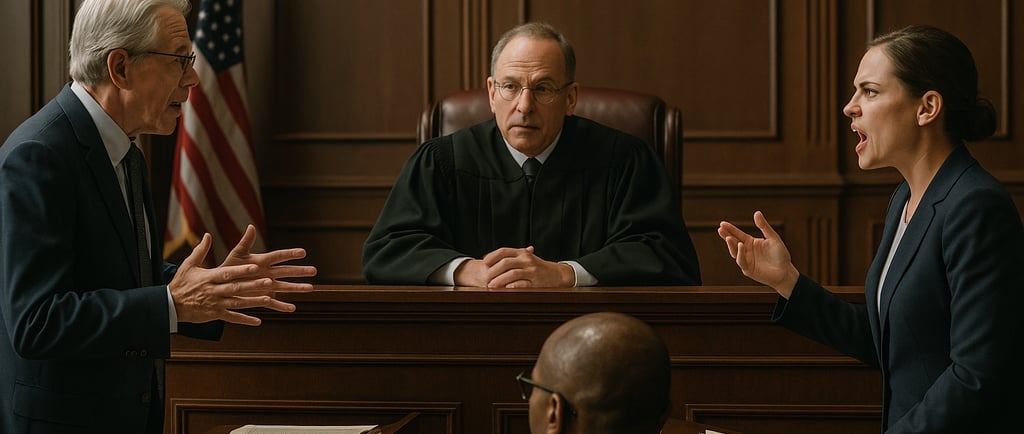Tariffs Resurge: Supreme Court Skirmish, Presidential "Unlimited Power" Questioned!
8/1/20253 min read


A legal drama shaking the nerves of global trade is unfolding in the U.S. Federal Circuit Court of Appeals. Recently, the highly anticipated case of "VOS Selections, Inc. v. Trump" saw its crucial en banc oral arguments. This is not just a legal battle over tariffs, but a profound questioning of the boundaries of presidential power in the realm of trade.
"Liberation Day" Tariffs: From Executive Order to Court Defendant
The story begins with the "Liberation Day" tariffs, enacted by the President Donald Trump's administration under the International Emergency Economic Powers Act (IEEPA), along with previous tariffs imposed on countries like Canada, Mexico, and China. These tariff measures aimed to address alleged trade deficits and national security threats.
However, these "grand" tariff policies quickly faced challenges in court. Lawsuits filed by small businesses and 12 state governments directly questioned their legality. Previously, the U.S. Court of International Trade (CIT) had unanimously ruled that IEEPA did not grant the President virtually unlimited tariff authority, and if it did, it would constitute an unconstitutional delegation of legislative power. This ruling had, for a time, threatened to halt some of the tariffs.
Federal Circuit Court of Appeals: Eleven Judges' Deep Interrogation
Now, the case has moved to the higher Federal Circuit Court of Appeals, where it is being heard by an en banc panel of eleven judges. During the oral arguments, the judges' questions were sharp, revealing deep skepticism about the administration's claims:
Does IEEPA authorize tariffs? One of the focal points of the debate is whether IEEPA itself allows the President to impose tariffs. Multiple judges expressed skepticism that the law grants him the authority to rewrite the tariff schedule or claim "unbounded authority." Several judges emphasized, as Judge Reyna noted, that "IEEPA doesn't even mention the word tariffs." From the beginning of this litigation, we have emphasized that IEEPA delegates authority to "regulate" importation, but regulation is distinct from taxation.
"Yoshida" case limitations: Even referencing the precedent of "United States v. Yoshida International Inc.," that case clearly stated that the President's emergency powers are not a "talisman" and cannot "rewrite the tariff schedules." The judges emphasized that if the "Yoshida" case applies to IEEPA, then its limitations on the scope of permissible tariff authority also apply.
"Major Questions Doctrine" and "Nondelegation Doctrine": Judges also suggested that unconstrained tariff authority would run afoul of the major questions doctrine and constitutional constraints on the delegation of legislative power to the executive. The CIT based its ruling in part on these considerations.
"Emergency" boundaries: IEEPA can only be invoked in the event of an "emergency" that poses an "unusual and extraordinary threat" to the U.S. economy and national security. The judges who raised this issue seemed skeptical of claims that what qualifies as an "unusual and extraordinary threat" is left to the unreviewable discretion of the president. Economists' amicus brief also pointed out that trade deficits themselves do not cause a decline in manufacturing.
Suspense Lingers: What's Next for Tariffs?
While the outcome of the court arguments is difficult to predict, the judges' questions suggest that the administration's claim of "the President having virtually unlimited, unreviewable tariff authority" seems to have little support.
After these oral arguments, the court will issue its decision at a later date. Regardless of the outcome, this legal battle will have a profound impact on future U.S. trade policy:
Clarifying Presidential Power Boundaries: The ruling may further clarify the legal boundaries of the U.S. President's emergency powers in trade.
Influencing Future Tariff Direction: The decision will directly affect the fate of the "Liberation Day" tariffs and may set new legal thresholds for future U.S. government tariff measures.
Increasing Global Trade Uncertainty: The lengthy and complex nature of legal disputes means that global businesses, when formulating trade strategies, must increasingly factor in legal risks and policy uncertainties.
This ongoing interplay between tariffs and law continues to unfold. We will keep you updated with the latest interpretations.
